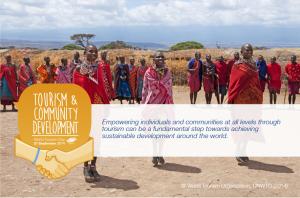
World Tourism Day (WTD), celebrated every year on 27 September, is a global observance to highlight tourism’s social, cultural, political and economic value.
WTD 2014 is being held under the theme Tourism and Community Development – focusing on the ability of tourism to empower people and provide them with skills to achieve change in their local communities. This focus is in line with the global transition to the Sustainable Development Goals as the guiding principle promoted by the UN from 2015 and beyond.
Tourism is one of the world’s largest industries and drivers of economic development. It represents 9% of global GDP, provides one in 11 jobs worldwide, and is a key revenue sector for developing and emerging economies. In some small island states it is the leading economic activity, and it is a key export and provider of foreign currency in many developing countries. The challenge in many of these countries, however, is to ensure that income from tourism doesn’t largely benefit large and foreign-owned companies, but filters down to local people and communities.
With the special focus on the community, WTD 2014 highlights how tourism can be conducive to advancing sustainable development from the grassroots level. Community based tourism involves the local population in the decision making process according to local priorities. The opportunity to become part of the tourism value chain actively involves host communities in the development process. Tourism thus becomes a catalyst of social cohesion, going beyond the immediate impact of job creation and its positive economic consequences and enhances, for instance, local governance capabilities which multiply the tourism impact even further.
Taleb Rifai, Secretary-General of the UNWTO, says: Tourism is a people-based economic activity built on social interaction, and as such can only prosper if it engages the local population by contributing to social values such as participation, education and enhanced local governance. At the same time, there can be no real tourism development if such development damages in any way the values and the culture of host communities or if the socio-economic benefits generated by the tourism sector do not trickle down to the community level. As stated in the UNWTO Global Code of Ethics for Tourism, “local populations should be associated with tourism activities and share equitably in the economic, social and cultural benefits they generate”.
This year's official celebrations will take place in Guadalajara, Mexico and include a high-level Think Tank on the 2014 theme with the participation of tourism Ministers, international experts and policy makers in the field of tourism and development.
Community Development information on the Leisure Tourism Database
A Smart Search set up for World Tourism Day on the Leisure Tourism Database brings together for subscribers the literature on community-based tourism, tourism and community development, and community participation in tourism. It finds over 2600 bibliographic records, including around 160 papers available in Full Text to subscribers, and about 120 CABI eBook chapters.
Those who do not currently subscribe to the database can still access freely available news articles on tourism and community development which have been written for the Leisure Tourism Database. A small selection of abstracts of relevant papers and book chapters are linked to below through DOIs.
Further reading
Events and community development. Jepson, A.; Clarke, A.; CABI, Wallingford, UK, Research themes for events, 2013, pp 6-17, many ref. http://dx.doi.org/10.1079/9781780642529.0006
Community development in volunteer tourism destinations. Wearing, S. L.; McGehee, N.; CABI, Wallingford, UK, International volunteer tourism: integrating travellers and communities, 2013, pp 39-48, many ref. http://dx.doi.org/10.1079/9781845936969.0039
Destination communities and responsible tourism. Timothy, D. J.; Leslie, D.; CABI, Wallingford, UK, Responsible tourism: concepts, theory and practice, 2012, pp 72-81, many ref. http://dx.doi.org/10.1079/9781845939878.0072
Tourism development and destination community residents. Jurowski, C.; CABI, Wallingford, UK, Destination marketing and management: theories and applications, 2011, pp 284-299, many ref. http://dx.doi.org/10.1079/9781845937621.0284
Community-based island tourism: the case of Boa Vista in Cape Verde. Sánchez-Cañizares, S. M.; Castillo-Canalejo, A. M.; International Journal of Culture, Tourism and Hospitality Research, 2014, 8, 2, pp 219-233, 52 ref. http://dx.doi.org/10.1108/IJCTHR-04-2012-0015
Mountain bike tourism and community development in British Columbia: critical success factors for the future. Freeman, R.; Thomlinson, E.; Lamont, M.; Tourism Review International, 2014, 18, 1/2, pp 9-22, 50 ref. http://dx.doi.org/10.1108/IJCTHR-04-2012-0015
Toward a community-driven development model of rural tourism: the Chinese experience. Zou TongQian; Huang SongShan; Ding PeiYi; International Journal of Tourism Research, 2014, 16, 3, pp 261-271, many ref. http://dx.doi.org/10.1002/jtr.1925
The legacy of war for community-based tourism development: learnings from Cambodia. Ellis, S.; Sheridan, L. M.; Community Development Journal, 2014, 49, 1, pp 129-142, 32 ref. http://dx.doi.org/10.1093/cdj/bst015
